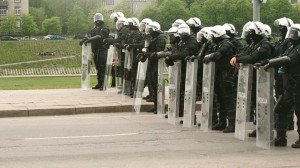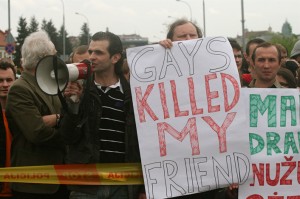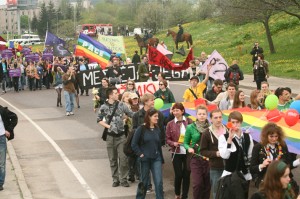The roughly 450 participants were well-protected by police as they marched along the northern banks of the Neris River in Vilnius. Photo by Nathan Greenhalgh/Baltic Reports
VILNIUS — On a humid Saturday afternoon, Lithuania took a step toward real integration into the European Union by staging its first-ever gay pride parade in the capital city Vilnius.
The Baltic Pride 2010 parade “For Equality,” which conservatives in the predominantly Catholic country had repeatedly tried to block, finally went ahead after a temporary permit revocation just days before the scheduled event.
Artūras Rudomanskis, head of the Youth Tolerance Association and one of the co-organisers of the parade, told Baltic Reports that on the eve of the march, their office had its windows smashed by rocks. Two Molotov cocktails were thrown, but no fire started. One of the glass jars filled with petrol did not smash, giving police a record of the criminal’s fingerprints.
With this incident in mind, hundreds of participants met at the Conti Hotel near the city center and were bused to the river esplanade where they assembled and started playing drums. Already at 11.30 a.m., half an hour before the parade was due to start, anti-gay protesters were waving banners and chastising police.
Despite several charges at the barricades and smoke bombs, plastic bottles and uncooked sausages thrown at police by the anti-gay protesters, there was no violence only 12 arrests, which included several members of parliament. Seimas member Petras Gražulis, the mouthpiece of the anti-gay movement in the country, was among those taken away by police.
There had been rumors originating from the Interim Prosecutor General Raimondas Petrauskas that anti-gay radicals would attack the participants upon entrance and exit to the parade, but when the buses rolled up to the perimeter of the fenced area, only the teal fatigues of the Vilnius police force could be seen. The barricades were hundreds of meters from parade route, leaving the anti-gay protesters largely out of sight for parade participants.

Over 800 police in full riot gear kept guard of the event. Photo by Nathan Greenhalgh/Baltic Reports
Immediately upon exiting the buses, participants — which hailed from all over the world — unfurled flags and began beating drums, blowing whistles and clashing cymbals. In the background, over 800 police in full riot gear kept guard as the parade winded along the river from Forum Palace to the grassy area in front of the Reval Hotel on the northern banks of the Neris.
Political support
After some brief rain before the parade, the sky showed its support for the activists, producing a symbolic rainbow.
After the march, led to the grass esplanade where speakers were booming out feel-good house music in between various speakers giving rousing speeches on the event’s importance and supporting sexual minority rights.
“It’s a landmark event,” John Dahlvisen of UK Amnesty told Baltic Reports. “I think it was a fabulous opportunity for ordinary people to celebrate ordinary rights.”
Politicians from Lithuania and all over Europe joined the parade.
Seimas member Rokas Žilinskas was posing for the cameras with the huge rainbow flag and told Baltic Reports that although he had been skeptical at first, he was out campaigning for human rights, not only gay rights.
“Lithuania isn’t purely gay and it isn’t purely homophobic. There are different kinds of people — radicals who are for and radicals who are against. There are moderates who are for and moderates who are against and this constitutes grounds for discussion and I believe that in this discussion the truth will be found,” Žilinskas said. “After this weekend, temperatures will drop down and discussion will continue and Lithuania will find the truth and will face it.”
“Initially I was skeptical about the parade as I much prefer open discussion … but this about human rights and every citizen must understand this. That is is why I changed my mind and came. I came here to protect my rights,” Žilinskas said.
Social Democrat Marija Aušrinė Pavilionienė said the parade means Lithuania is becoming a real democratic nation.
“I have been with this movement for 13 years and I have been defending their rights from the start once I understood what human nature is, what sexuality is,” Pavilionienė told Baltic Reports. “So, for me as a member of parliament and as a person, this event means the victory of human rights and freedom in Lithuania. It means one more step towards democracy.”
On the Interim Prosecutor General’s attempt to have the parade’s permit revoked just days before it was due to happen, Pavilionienė said that Petrauskas had failed in his attempts to earn political points with the conservative parties, who have the power to vote him into the country’s top law enforcement position permanently.
“I pity him. I just pity him. He does not understand and maybe he had a hope that after this he would get the permanent place in the prosecutor’s position, but his hopes were ruined by the court’s decision to uphold the permit [to hold the parade],” Pavilionienė said.
The Swedish Minister of European Union Affairs Birgitta Ohlsson told the crowd that love cannot be outlawed.
“Today we are marching for freedom. Today we are marching for equality. Today we are marching for Europe … we are creating history this moment right now,” the pregnant minister said.
“This is the first time in Lithuania and in Vilnius that proud gay, lesbian and trans-gender people are having a pride parade and I would like to thank the mayor of Vilnius for doing the right thing and supporting human rights. The future belongs to us here today and not to the others, the prejudiced.”
The openly gay Michael Cashman, a British member of European Parliament and president of the EP’s intergroup on gay and lesbian issues, told journalists that of all people, Lithuanians should be able to empathize with the struggle for freedom.
“I think its extremely important because we are all equal and all the countries are equal and the right to express yourself, to assembly and equality is something that we all celebrate and a country like Lithuania that lived under Soviet domination should be celebrating an individual’s right to freedom,” Cashman said adding that the United Kingdom had struggled with the issues in the past.
“We are not homophobic, you are just abnormal”
Meanwhile, down the other end of the cordoned off area, anti-gay protesters were throwing smoke bombs, rocks, bottles and yelling chants such as “pederasts,” “homo Nazis” and “homo diktatura” (“homo dictator”). More than 1,500 people watched the parade from outside the barriers, although most were not participating in the anti-gay demonstration.

Anti-gay protesters were held back by police and barricades. Photo by Nathan Greenhalgh/Baltic Reports
Signs saying “Gays killed my friend” and “We are not homophobic, you are just abnormal” were waved. A megaphone was used by Stanislovas Buškevičius, the Kaunas city council member who petitioned the court with the general prosecutor on the grounds that police would be unable to prevent violence, to rally the anti-gay protesters. He was also arrested later.
At the other end of the ground, an inflatable canoe with two protesters tried to land and come aground to the joy of people across the water, but police quickly pushed them off down stream while they yelled obscenities about the parade participants.
When asked why they were against the protest, anti-gay protesters expressed fear that homosexuals would encourage children to become gay. In fact, many children were brought by their parents to the anti-gay rally.
“We don’t want our children to be gay,” Paulius, 14 of Vilnius, told Baltic Reports. “I’m afraid that there will be homosexuals in Lithuania and I don’t want to have homosexual friends. I’m afraid of them.”
Celebration
However, with the backdrop of the esplanade covered in dandelions and the anti-gay protester too far away to be heard or seen, participants lauded the event.
Darius Sužiedėlis, a 41-year-old Lithuanian involved in the pro-democracy movement in the late 1980s, flew all the way from his current residence in Brazil to take part in the parade.
“I would never miss it,” Sužiedėlis told Baltic Reports. “I was active in the democracy movement in the late 1980s, and this is part of that.”
BALTIC REPORTS VIDEO REPORT
Vladimir Simonko, head of the Lithuanian Gay League and one of the key organizers of the parade told Baltic Reports after the speeches that he was surprised at the support that came out for the parade.
“I hope we will do more things with LGBT rights in Lithuania with Lithuanian and international help. We see that Lithuanian participants are not afraid to come to parade and I’m really sorry for participants who couldn’t join. Maybe next year we will make a bigger parade,” he said.
Though many of the participants were from abroad, Simonko said that the Lithuanian contingent was large.
“Maybe half [were locals] — there are more Lithuanians than international guests and that surprised me — we have a civil society and a brave community.”
Next year the Baltic Pride parade will be held in Estonia.
— Baltic Reports editor Nathan Greenhalgh contributed to this article.
This article is free to view. To read Baltic Reports’ subscription-only articles, click here.














I think that Kanuas needs to have a Gay rights protest. We need to ensure that Mr. Buškevičius doesn’t abuse his power to stop Gay protests. So long as Kanuas is in the EU, Kanuas needs to follow EU law.
The officals that abused their power to try and stop the parade should be sanctioned by the EU.
I feel really sad for the Gay children (invariably there are some) that were brought by their parents to the anti-Gay event. I guess those parents will wonder why their kids move away and lose contact with them.
What about the youtube video showing the neo-Nazis at the protest? Were they connected to the three elected officials at the anti-Gay parade?
PYDERASTAI LAUK (GAYS AWAY)
Go back to the your cave Normai..
Lithuania didn’t allow any gay parades for a good reason, and it is for the safety of the gay’s themselves. Its the EU’s fault for forcing Lithuania to have it, if they didnt none of that would have happened. Im not against gays at all I realy couldnt care less what people do in their own time but i still think that the gay parade is a stupid idea because they already prove that they are very different from the so called “normal” because heterosexual people dont realy have parade’s now do they.
they need a parade for the same reasons womens need an international day, oppression and inequalities( except that in Lithuania you managed to turn that day into a “give a flower” day).
with a parade and internatioanl events one just points out these issues instead of being blind to them.
I like to agree with Mat.
@Kat: in every capital city, on a daily basis, parades and manifestations are held. Pride parades are just one of them. I just read that Latvia will hold a “Blonde parade”: women celebrating the fact that they were born blond. Personally, I think it is a ridiculous idea, but does that give me the right to organize an anti-event and throw things at them?
[…] Gay League together with the Tolerant Youth Association had finally won permission to hold the first ever gay pride march in Lithuania. Darius was tormented over wanting to come to Vilnius to march and not really having […]